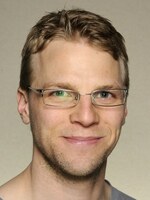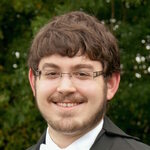About the Authors

Gus Gutoski
Postdoctoral Scholar
Perimeter Institute for Theoretical Physics
Waterloo, Ontario, Canada
ggutoski[ta]perimeterinstitute[td]ca
www.perimeterinstitute.ca/personal/ggutoski/
Postdoctoral Scholar
Perimeter Institute for Theoretical Physics
Waterloo, Ontario, Canada
ggutoski[ta]perimeterinstitute[td]ca
www.perimeterinstitute.ca/personal/ggutoski/
Gus Gutoski was born in Kitchener, Ontario, twin city of Waterloo, Ontario.
After completing a BMath at the
University of Waterloo he briefly
escaped the Region of Waterloo for a MSc at the
University of Calgary in Calgary,
Alberta.
Unfortunately, his graduate advisor,
John Watrous, subsequently
took a position at the University of Waterloo.
Gus reluctantly followed his advisor back to his hometown and
completed a Ph.D. in Computer Science at the University of Waterloo.
He is currently a postdoctoral researcher at the
Perimeter Institute for
Theoretical Physics in Waterloo and he cannot get enough of Waterloo.
Gus's research interests include quantum complexity theory, quantum
cryptography, and, lately, Bitcoin.

Patrick Hayden
Professor of Physics
Department of Physics, Stanford University
Stanford, California, USA
phayden[ta]stanford[td]edu
web.stanford.edu/~phayden
Professor of Physics
Department of Physics, Stanford University
Stanford, California, USA
phayden[ta]stanford[td]edu
web.stanford.edu/~phayden
Patrick Hayden received his D.Phil.\ in Physics from the University
of Oxford in 2001 under the supervision of Artur Ekert.
Subsequently he was a postdoc at Caltech before joining the
faculty at McGill University, where he spent
nine happy years before moving to Stanford
in 2013. Like many computer scientists, Hayden developed an
interest in complexity theory because of its
possible relevance to black
hole physics. His other research interests include skiing and
backcountry camping. Outside of work, Hayden enjoys proving
theorems in quantum communication theory and studying the emergence
of spacetime.

Kevin Milner
Ph.D. student
University of Oxford, Oxford, UK
kamilner[ta]kamilner[td]ca
Ph.D. student
University of Oxford, Oxford, UK
kamilner[ta]kamilner[td]ca
Kevin Milner did his undergraduate studies at the
University of Alberta where he developed an
interest in complexity theory before joining
McGill University to study quantum
information for his M.Sc., under the supervision of Patrick Hayden. His
hobbies include breaking and fixing the Internet, which he now studies
as a D.Phil. student supervised by
Cas Cremers at
the University of Oxford, and not worrying
about the Internet, which he now studies whenever he can.

Mark M. Wilde
Assistant Professor
Hearne Institute for Theoretical Physics
Department of Physics and Astronomy
Center for Computation and Technology
Louisiana State University
Baton Rouge, Louisiana, USA
mwilde[ta]lsu[td]edu
www.markwilde.com
Assistant Professor
Hearne Institute for Theoretical Physics
Department of Physics and Astronomy
Center for Computation and Technology
Louisiana State University
Baton Rouge, Louisiana, USA
mwilde[ta]lsu[td]edu
www.markwilde.com
Mark M. Wilde was born in Metairie, Louisiana, USA.
He received the Ph.D. in electrical engineering from the
University of Southern California, Los Angeles,
in 2008, and was
advised by Todd Brun. He is an
Assistant Professor in the Department of Physics and Astronomy and the
Center for Computation and Technology at
Louisiana State University. His
current research interests are in quantum Shannon theory, quantum optical
communication, quantum computational complexity theory, and quantum error
correction. He has elected not to include any humor in his bio because he finds
the above three bios to be about as unfunny as “unfunny” can be and
fears that any attempt of his would be worse.
He also recognizes that this is the first time
he has roasted his coauthors in the second-to-last
sentence of a published scientific paper.
